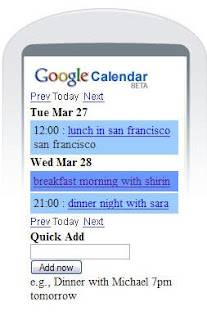Month: May 2007
Google Calendar now mobile

The Google Blog has recently announced that Google Calendar is now mobile phone-friendly. Simply visit http://calendar.google.com on your mobile device and a screen similar to the one above will be presented to you.
What has this to do with educational technology? Well, as I’ve mentioned before over at teaching.mrbelshaw.co.uk, Google Calendar can be employed as a powerful and convenient lesson planning tool. However, there are times when your desktop access to the Internet is down. At my current school, that’s quite often. Being able to check your lesson plans on your mobile is perfect!
Coursework 2.0

It’s coursework trips for my Year 10 GCSE History students this week. School trips have been the same for decades, but I can’t help but think there are ways in which they could be improved. Here’s three suggestions:
![]()
1. Use Twitter to stay in touch with students
The great thing about Twitter is that it has the potential to send free SMS messages to mobile phones without the sender having to know the phone number of the recipient. This isn’t the place for a step-by-step guide, but the process would go something like this:
- Teacher signs up for Twitter account
- Teacher goes to ‘Settings’, enters phone number and confirms via SMS.
- Students sign up for Twitter accounts
- Students go to teacher’s Twitter home page and add them to their network
- Students add mobile numbers to their Twitter accounts
- Students choose to be updated via SMS when someone in their network posts something to Twitter
This would solve the problem of quickly and easily getting messages to whole classes or groups on school trips. Of course, for one trip it might be a bit of a hassle, but think about if you had it set up to remind them about homework as well… 🙂

2. Create a wiki to record experiences
Wikis are great things to use with students anyway, given that they encourage collaboration and show that information and knowledge should be used for a specific purpose. They come into their own, however, when used for such things as recording experiences from coursework trips.
Students are likely to remember and record different things. They can add their experiences, ideas and thoughts to the wiki to share with others. Further research can be done, and knowledge specific to that trip can be created.

3. Encourage students to share photographs and geotag them
Most students nowadays are going to use the digital cameras built into their mobile phones to record things. Having a 2 megapixel camera in your phone these days is not something to brag about. My new one, for example, is 5 megapixels! These can then be sent via Bluetooth to a teacher/central repository on the bus on the way back from the trip.
Alternatively, or additionally, they could be sent directly to a service such as Flickr with pre-set tags. These could all be shared using an embedded slideshow, made possible through the use of tools such as flickrSLiDR. The really exciting thing is the automatic geotagging of photographs. My new Nokia N95, for example, has GPS built in, so can do this on-the-fly. Great stuff, and a good way to share visual resources.
